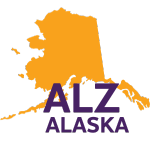As we anticipate “springing forward” on Sunday, March 10, 2024, losing an hour of sleep becomes a familiar topic, as well as the quick and highly anticipated return of daylight. While many eagerly await the longer daylight hours, for those facing Alzheimer’s disease and related dementias, this shift can heighten the challenges associated with “sundowning,” especially as we transition into the springtime in the Last Frontier. In Alaska, where families play a crucial role as unpaid caregivers for loved ones, the changing time and increasing daylight serve as a reminder to monitor loved ones for potential behavioral changes.
What is Sundowning?
What exactly is sundowning? It encompasses a range of symptoms commonly experienced by those with dementia, including anxiety, restlessness, hallucinations, mood swings, and heightened confusion. Often peaking during late afternoon and early evening hours, sundowning is closely tied to disruptions in sleep and wake cycles, a connection that the transition of Daylight Savings Time can exacerbate. While the root cause of sundowning remains unclear, there are strategies families can employ to help manage these challenges. Enhancing our understanding of sundowning empowers us to better support our loved ones as they navigate this discomfort.

Helpful Tips
Here are some tips offered by the Alzheimer’s Association to caregivers in Alaska to help them navigate sundowning in their loved ones:
- Prioritize your own rest to minimize unintentional stress signals that may affect your loved one.
- Recognize the emotional sensitivity of individuals with dementia and cultivate an environment of safety and reassurance.
- Plan activities and essential tasks earlier in the day when cognitive alertness tends to be higher.
- Keep track of preceding events and potential triggers leading up to sundowning episodes.
- Minimize evening stimulation such as loud noises, television, or demanding chores to alleviate confusion.
- Opt for a larger midday meal and lighter evening fare to support better digestion and comfort.
- Ensure adequate lighting in the home during evening hours to reduce disorientation.
- Do not physically restrain the person. It can make agitation worse.
- Allow for supervised pacing or movement as needed.
- Incorporate daytime exercise to help manage restlessness, whether through walks, gentle activities, or music.
- Consult with medical professionals about medication schedules for optimal effectiveness.
Alzheimer’s disease remains a significant public health challenge in Alaksa. The Alzheimer’s Association remains committed to providing support and resources to families at no charge. This includes access to a 24/7 Helpline staffed by trained professionals.
To learn more about available programs and services, visit http://www.alz.org/alaska.



Leave a comment